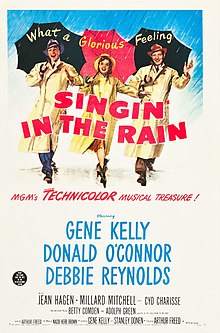
Back Cine musical AN فيلم موسيقي Arabic فيلم مزيكا ARZ Musiqili film Azerbaijani Мюзикъл Bulgarian সঙ্গীতধর্মী চলচ্চিত্র Bengali/Bangla Cinema musical Catalan Музыкин фильм CE فیلمی مۆسیقایی CKB Filmový muzikál Czech

Musical film is a film genre in which songs by the characters are interwoven into the narrative, sometimes accompanied by dancing. The songs usually advance the plot or develop the film's characters, but in some cases, they serve merely as breaks in the storyline, often as elaborate "production numbers".
The musical film was a natural development of the stage musical after the emergence of sound film technology. Typically, the biggest difference between film and stage musicals is the use of lavish background scenery and locations that would be impractical in a theater. Musical films characteristically contain elements reminiscent of theater; performers often treat their song and dance numbers as if a live audience were watching. In a sense, the viewer becomes the diegetic audience, as the performer looks directly into the camera and performs to it.
With the advent of sound in the late 1920s, musicals gained popularity with the public and are exemplified by the films of Busby Berkeley, a choreographer known for his distinctive and elaborate set pieces featuring multiple showgirls. These lavish production numbers are typified by his choreographic work in 42nd Street, Gold Diggers of 1933, Footlight Parade (all from 1933). During the 1930s, the musical films of Fred Astaire and Ginger Rogers became massive cultural fixtures in the eyes of the American public. These films included, Top Hat (1935), Follow the Fleet, Swing Time (both 1936), and Shall We Dance (1937). Victor Fleming's The Wizard of Oz (1939) would become a landmark film for movie musical as it experimented with new technology such as Technicolor.
During the 1940s and 1950s, musical films from MGM musicals regularly premiered. These works included: Meet Me in St. Louis (1944), Easter Parade (1948), On the Town (1949), An American in Paris (1951), Singin' in the Rain (1952), The Band Wagon (1953), High Society (1956), and Gigi (1958). During this time, films outside the Arthur Freed unit at MGM included Holiday Inn (1942), White Christmas (1954), and Funny Face (1957) as well as Oklahoma! (1955), The King and I (1956), Carousel, and South Pacific (1958). These films of the era typically relied on the star power of such film stars as Fred Astaire, Gene Kelly, Bing Crosby, Frank Sinatra, Judy Garland, Ann Miller, Kathryn Grayson, and Howard Keel. They also relied on film directors such as Stanley Donen and Vincente Minnelli as well as songwriters Comden and Green, Rodgers and Hammerstein, Irving Berlin, Cole Porter, and the Gershwin Brothers.
During the 1960s, films based on stage musicals continued to be critical and box-office successes. These films included, West Side Story (1961), Gypsy (1962), The Music Man (1962), Bye Bye Birdie (1963), My Fair Lady, Mary Poppins (both 1964), The Sound of Music (1965), A Funny Thing Happened on the Way to the Forum, How to Succeed in Business Without Really Trying, Thoroughly Modern Millie (all 1967), Oliver!, and Funny Girl (both 1968). In the 1970s, film culture and the changing demographics of filmgoers placed greater emphasis on gritty realism, while the pure entertainment and theatricality of classical-era Hollywood musicals was seen as old-fashioned. Despite this, Scrooge (1970), Willy Wonka & the Chocolate Factory (1971), Fiddler on the Roof (1971), Cabaret (1972), 1776 (1972), Disney's Bedknobs and Broomsticks (1971), and Pete's Dragon (1977), as well as Grease and The Wiz (both 1978), were more traditional musicals closely adapted from stage shows and were strong successes with critics and audiences. Throughout the 1980s and 1990s, musicals tended to be mainly coming from the Disney animated films of the period, from composers and lyricists, Howard Ashman, Alan Menken, and Stephen Schwartz. The Disney Renaissance started with 1989's The Little Mermaid, then followed by Beauty and the Beast (1991), Aladdin (1992), The Lion King (1994), Pocahontas (1995), The Hunchback of Notre Dame (1996), Hercules (1997), and Mulan (1998).
In the 21st century, the musical genre has been rejuvenated with darker musicals, musical biopics, musical remakes, epic drama musicals and comedy drama musicals such as Moulin Rouge! (2001), Chicago (2002), The Phantom of the Opera (2004), Rent (2005), Dreamgirls (2006), Across the Universe, Enchanted, Hairspray, Sweeney Todd: The Demon Barber of Fleet Street (all 2007), Mamma Mia! (2008), Nine (2009), The Muppets (2011), Les Misérables (2012), Into the Woods (2014), La La Land (2016), Beauty and the Beast, The Greatest Showman (both 2017), Mamma Mia! Here We Go Again!, A Star Is Born, Mary Poppins Returns, Bohemian Rhapsody (all 2018), Aladdin, Rocketman, The Lion King (all 2019), In the Heights, Respect, Dear Evan Hansen, Cyrano, Everybody's Talking About Jamie, Tick, Tick… Boom!, West Side Story (all 2021), Elvis, Spirited, Disenchanted, Matilda the Musical (all 2022), The Little Mermaid, Wonka, The Color Purple (all 2023), Mean Girls, Wicked, Mufasa: The Lion King, Joker: Folie à Deux, A Complete Unknown (all 2024).